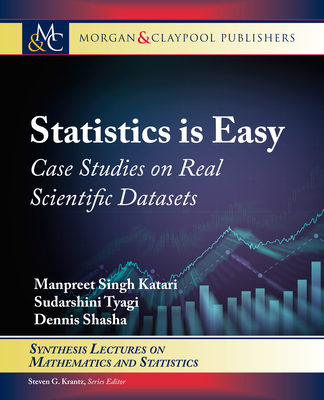Statistical Learning from a Regression Perspective
暫譯: 從迴歸的角度看統計學習
Berk, Richard a.
- 出版商: Springer
- 出版日期: 2021-06-30
- 售價: $4,050
- 貴賓價: 9.5 折 $3,848
- 語言: 英文
- 頁數: 433
- 裝訂: Quality Paper - also called trade paper
- ISBN: 3030429237
- ISBN-13: 9783030429232
海外代購書籍(需單獨結帳)
商品描述
Statistical Learning from a Regression Perspective considers statistical learning applications when interest centers on the conditional distribution of the response variable, given a set of predictors, and when it is important to characterize how the predictors are related to the response. As a first approximation, this is can be seen as an extension of nonparametric regression. Among the statistical learning procedures examined are bagging, random forests, boosting, and support vector machines. Response variables may be quantitative or categorical.
Real applications are emphasized, especially those with practical implications. One important theme is the need to explicitly take into account asymmetric costs in the fitting process. For example, in some situations false positives may be far less costly than false negatives. Another important theme is to not automatically cede modeling decisions to a fitting algorithm. In many settings, subject-matter knowledge should trump formal fitting criteria. Yet another important theme is to appreciate the limitation of one's data and not apply statistical learning procedures that require more than the data can provide.
The material is written for graduate students in the social and life sciences and for researchers who want to apply statistical learning procedures to scientific and policy problems. Intuitive explanations and visual representations are prominent. All of the analyses included are done in R.
商品描述(中文翻譯)
《從迴歸的角度看統計學習》考慮了統計學習應用,當關注點集中在響應變數的條件分佈上,給定一組預測變數時,並且重要的是要描述預測變數與響應之間的關係。作為第一個近似,這可以被視為非參數迴歸的擴展。所考察的統計學習程序包括袋裝法(bagging)、隨機森林(random forests)、提升法(boosting)和支持向量機(support vector machines)。響應變數可以是定量的或類別的。
強調真實應用,特別是那些具有實際意義的應用。一個重要的主題是需要在擬合過程中明確考慮不對稱成本。例如,在某些情況下,假陽性可能遠比假陰性成本低。另一個重要的主題是不要自動將建模決策讓渡給擬合算法。在許多情況下,專業知識應該優先於正式的擬合標準。還有一個重要的主題是要認識到數據的局限性,並且不要應用超出數據所能提供的統計學習程序。
這些材料是為社會科學和生命科學的研究生以及希望將統計學習程序應用於科學和政策問題的研究人員撰寫的。直觀的解釋和視覺表現非常突出。所有包含的分析都是在 R 語言中完成的。
作者簡介
作者簡介(中文翻譯)
理查德·伯克是加州大學洛杉磯分校(UCLA)榮譽統計學特聘教授,目前在賓夕法尼亞大學的統計學系和犯罪學系擔任教授。他是美國統計學會和美國科學促進會的當選會士,並曾在多個組織中擔任專業職務,例如國家研究委員會的應用與理論統計委員會以及社會科學研究委員會的董事會。他的研究涵蓋了社會科學和自然科學中各種統計應用。


















